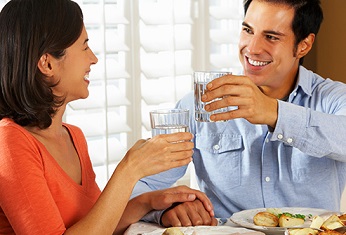


People often have debates on whether drinking water with meals is good for digestion. There are opinions claiming that the intake of fluids hinders the bile and stomach acid from breaking down foods and absorbing required nutrients. While others insist that water can be taken while eating as it aids digestion.

Of course, drinking water while eating is okay. Water intake does not really affect the stomach’s pH. In fact, it can benefit you in various ways.
When you drink water with your meals, it helps soften the food, which is a great aid for digestion and nutrients absorption. Water also helps keep the digestive tract lubricated and prevent constipation and bloating by softening stools.
The good thing about drinking water with meals is that it makes you feel full and thereby prevents excessive and unnecessary food intake. Drinking water can make you take breaks while eating, causing you to eat slowly.
The liver needs enough water to function properly. The blood transports microscopic food particles from the intestines to the liver. The liver then transports these nutrients to other parts of the body. During this process, the liver will select the ones it needs for future use and the ones that should be delivered. This process requires sufficient water, so drinking water while eating is actually a good thing for the liver.
Can you drink water while eating? The answer is yes as water can help saliva production. The salivary glands will be able to produce more saliva when you drink water. Actually, digestion begins in the mouth, so when there is adequate saliva production, the food will easily get soft when you chew and pass easily to the stomach.
Unknown to most people, they are actually doing good to their teeth when they drink water with their meals. Water, such as tap and bottled water, contain fluoride which is essential for strong and cavity-free teeth.
Warning: Drinking water while eating have its benefits, but you should never drink excessive amount of water. When you have a lot of water with your meals, you might end up diluting your blood, causing an electrolyte imbalance which can lead to hyponatremia. You may also experience weak muscles, digestive issues, and uneven heartbeats. You are drinking too much water if you have to go to the bathroom several times during the meal.
Now you know drinking water while eating is a good thing, here are some other things that you should pay attention to while enjoying your meal.
Sitting down is better than standing when it comes to eating. When you sit, you tend to eat less food, thus reducing calorie intake. This is because sitting down can slow down your eating pace as people tend to be in a rush when standing. While eating, it takes 20 minutes for the brain to receive the signal that you are satisfied, and slowing down your eating pace will enable you receive the message, which will help you decide when to stop eating.
Talking while eating is not advisable, as it not only prevents you from properly chewing your food, but can also make foods go into the lungs or nose, which is very dangerous and could even lead to death! Besides, we could be unaware that there are infectious organisms in our system, and when we talk while eating, these infectious organisms could easily spread into the food and affect people around us. For the above reasons, it is better to keep silent while eating.
Always remember to stay calm if you choke while eating. Do not drink liquids of any sort to try to wash down the food. Instead, try to cough very hard and see if it comes out, if it doesn’t work, you will have to do the Heimlich maneuver by yourself. Start by making a fist with one of your hands and place the thumb of the fist under the ribcage, parallel to the belly button. Use the other hand to support the fist, and in a quick, hard motion push against your stomach’s pit. Try to use the back of a chair or table corner for support. Use the same hard motion and push your body against the object to get rid of the choking particle.